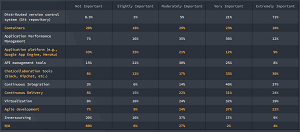News
Dev Tools Survey: Open Source Rules
- By David Ramel
- November 2, 2016
GitLab today published a new survey report investigating how developers work with a focus on development tools, where open source wares have made a huge impact.
"Modern developers prefer open source for work and for personal projects," said the new 2016 Global Development Report -- How Developers Work. "98 percent of developers say they use open source tools, and 75 percent say at least half of their tools are open source."
Git, the popular, free and open source distributed version control system, ranks No. 1 in this area, of course, as the survey was conducted by GitLab, which provides Git repository management, code reviews, issue tracking, activity feeds and wikis.
"When looking at the tools and techniques that are most important to developers, 92 percent say distributed version control systems (Git repositories) are very or extremely important for their everyday work," the survey said.
The "distributed version control systems (Git repositories)" answer was rated "extremely important" by 71 percent of respondents, followed by Continuous Integration (37 percent); and "chat/collaboration tools (Slack, Hipchat, etc.)" (30 percent).
 [Click on image for larger view.]
Dev Tools Ranked by Importance (source: GitLab)
[Click on image for larger view.]
Dev Tools Ranked by Importance (source: GitLab)
The availability of the latest dev tools is a major concern of developers generally, as 81 percent of respondents said it's critical for organizations to use the latest development tools, and 36 percent said they would reject a job if the employer doesn't use the latest tools. Furthermore, almost all (91 percent) of coders said they use the same dev tools for work and personal projects.
Developers reported great freedom in choosing their own tools (44 percent of respondents affirmed this), with senior leadership choosing the tools that their teams must use less than 20 percent of the time. If execs do pick the tools to be used, 11 percent of respondents said they still use whatever they want.
The report also found that traditional methodologies may be fading in advance of collaboration (which was listed as the No. 1 benefit of Git). "Developers indicate the demise of Waterfall, Scrum, and Agile in support of more collaborative techniques," the report said. "The way developers work is shifting and now less than half of modern developers are using the once-popular Waterfall, Scrum, or Agile software development methods. An emphasis on the need for collaboration and automated integration exposes developers' desire for more natural and conversational work styles."
That finding led GitLab exec Erica Lindberg to proclaim "Conversational Development is the new Agile" in a blog post about the survey. "Software development methodologies have come a long way over the last few decades: Scrum replaced the inflexible Waterfall Method, and Agile improved the time-consuming method of Scrum," Lindberg said. "Now, as more development teams are distributed globally and the market demands speed and innovation, a more flexible process is needed."
"Conversational Development (ConvDev) is a natural process of accelerating the development lifecycle that threads a conversation through every step of the development process," Lindberg continued. "With ConvDev, gatekeepers become a part of the conversation and can monitor the entire process -- starting with an idea all the way to production. Cycle time is reduced by threading all conversations through every stage of the development lifecycle."
GitLab summed up those findings and others in a top 10 list of key takeaways:
- Developers are tired of outdated systems and crave modern tools.
- Open source tools are the most preferred.
- Git is ranked the most important development tool.
- The age of process-driven methodologies is ending.
- Collaboration is critical to developer workflows.
- Continuous integration is integral to everyday work.
- Security remains a major concern -- innersourcing helps.
- Learning curve is the biggest challenge when it comes to adopting Git.
- Pressure to meet a deadline is the top reason code is released before it’s ready.
- Unclear direction and unrealistic deadlines are the biggest obstacles to getting work done.
"As developers continue to gain control over the tools they use at work, there will be an even greater push to choose open source and Git, and to adopt workflows that are naturally collaborative," Lindberg concluded. "Teams that can ship quicker, smaller changes are poised to dominate the market."
The survey methodology was listed as: "GitLab surveyed 362 start-up and enterprise CTOs, developers and DevOps professionals globally who use their platform from July 6 through July 27 via SurveyMonkey."
About the Author
David Ramel is an editor and writer at Converge 360.